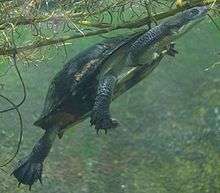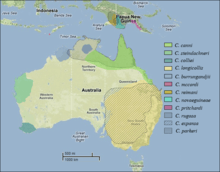Chelodina
| Chelodina Temporal range: Eocene–Recent | |
|---|---|
 | |
| Australian Snake-necked Turtle (Chelodina longicollis) | |
| Scientific classification | |
| Kingdom: | Animalia |
| Phylum: | Chordata |
| Class: | Sauropsida |
| Order: | Testudines |
| Suborder: | Pleurodira |
| Family: | Chelidae |
| Subfamily: | Chelodininae |
| Genus: | Chelodina Fitzinger, 1826 [1] |
 | |
Chelodina, collectively known as snake-necked turtles, is a large and diverse genus of long-necked Chelid turtles with a complicated nomenclatural history.[2] Although in the past Macrochelodina and Macrodiremys have been considered separate genera and prior to that all the same, they are now considered subgenera of the Chelodina.[2]
Chelodina is an ancient group of Chelid turtles native to Australia, New Guinea, the Indonesian Rote Island, and East Timor. The turtles within this subgenus are small to medium-sized, with oval shaped carapace. They are side-necked turtles, meaning they tuck their head partially around the side of their body when threatened instead of directly backwards.
Macrochelodina represents those species that have often been termed the Chelodina B group, or thick necked snake neck turtles. The subgenus was described in 1985 by Wells & Wellington (as a new genus) but was not recognized until recently when it was shown that the name was valid. As such they are a side-neck turtle of the family Chelidae with extremely long necks and long flattened heads. They are specialist fish eaters using a strike and gape mode of feeding. They are medium to large species with the largest Chelodina (M.) expansa reaching shell lengths of some 45 cm (18 in).[3] The first fossils (C. (M.) alanrixi) are known from Queensland from the Eocene period (Lapparent de Broin, F. de, & Molnar, R. E., 2001).[4]
Macrodiremys is a monotypic genus recently split off from the rest of the Chelodina.[5] Its sole member is the enigmatic Chelodina (Macrodiremys) colliei from Western Australia.
Taxonomy
Current taxonomy follows that of Georges & Thomson, 2010[2] with updates from van Dijk et al. 2014.[6]
Synonymy
- Chelodina Fitzinger 1826
- Chelodina Fitzinger 1826:6
- Hydraspis Bell 1828:512
- Chelyodina Agassiz 1846:79 (nomen novum)
- Hesperochelodina Wells and Wellington 1985:9 (nomen nudum)
- Macrochelodina Wells and Wellington 1985:9
- Macrodiremys McCord and Joseph-Ouni 2007:57
- Type Species:
- Chelodina: Chelodina longicollis (Shaw, 1794)
- Macrochelodina: Chelodina rugosa Ogilby 1890:56 = Chelodina oblonga Gray 1841
- Macrodiremys: Chelodina oblonga McCord and Joseph-Ouni 2007 = Chelodina colliei
Species
Subgenus: Chelodina Fitzinger, 1826
- Chelodina (C.) canni McCord & Thomson, 2002[7] – Cann's Snake-necked Turtle
- Chelodina (C.) gunaleni McCord & Joseph-Ouni, 2007[8] – Gunalen’s Snake-necked Turtle
- Chelodina (C.) longicollis (Shaw, 1794) – Common Snake-necked Turtle
- Chelodina (C.) mccordi Rhodin, 1994b[9] – McCord's Snakeneck Turtle
- †Chelodina (C.) murrayi Yates, 2013[10]
- Chelodina (C.) novaeguineae Boulenger, 1888 – New Guinea Snake-necked Turtle
- Chelodina (C.) reimanni Philippen and Grossmann, 1990 – Reimann's Snakeneck Turtle
- Chelodina (C.) pritchardi Rhodin, 1994a[11] – Pritchard's Snakeneck Turtle, Pritchard's Long-necked Turtle
- Chelodina (C.) steindachneri Siebenrock, 1914 – Steindachners Long-necked Turtle, Dinner-plate Turtle
Subgenus: Macrochelodina Wells & Wellington, 1985[12]
- †Chelodina (M.) alanrixi de Broin and Molnar, 2001[13]
- †Chelodina (M.) insculpta de Vis, 1897[14]
- Chelodina (M.) burrungandjii Thomson, Kennett & Georges, 2000[15] – Arnhem Land Long-Necked turtle
- Chelodina (M.) expansa Gray, 1857 – Giant Snake-necked Turtle
- Chelodina (M.) kuchlingi Cann, 1997[16] – Kuchling’s Snake-necked Turtle
- Chelodina (M.) parkeri Rhodin and Mittermeier, 1976 – Parker’s Snake-necked Turtle
- Chelodina (M.) oblonga Gray, 1841[17] – North Australian Snake-necked Turtle
- Chelodina (M.) walloyarrina McCord & Joseph-Ouni 2007b:59[18] – Kimberley Snake-necked Turtle
Subgenus: Macrodiremys McCord & Joseph-Uoni 2007[5]
- Chelodina (M.) colliei Gray, 1856[19] – Narrow-breasted Snake-necked Turtle
References
- ↑ Fitzinger LJFJ. 1826. Neue classification der reptilien nach ihren natürlichen verwandtschaften. Nebst einer verwandtschafts-tafel und einem verzeichnisse der reptilien-sammlung des K. K. zoologischen museum's zu Wien. J.G. Hübner, Wien. vii, 66 pp.
- 1 2 3 Georges, A. & Thomson, S. 2010. Diversity of Australasian freshwater turtles, with an annotated synonymy and keys to species. Zootaxa 2496: 1–37.
- ↑ Macrochelodina expansa (Grey, 1856) - Broad-Shelled Turtle
- ↑ Lapparent de Broin, F. de, & Molnar, R. E., 2001: Eocene chelid turtles from Redbank Plains, Southeast Queensland, Australia. Geodiversitas: Vol. 23, #1, pp. 41-79
- 1 2 McCord, W.P. & Joseph-Uoni, M. (2007a). A New Genus of Australian Longneck Turtle (Testudines: Chelidae) and a New Species of Macrochelodina from the Kimberley Region of Western Australia (Australia. Reptilia 31:56–64.
- ↑ Turtle Taxonomy Working Group [van Dijk, P.P., Iverson, J.B., Rhodin, A.G.J., Shaffer, H.B., and Bour, R.]. 2014. Turtles of the world, 7th edition: annotated checklist of taxonomy, synonymy, distribution with maps, and conservation status. In: Rhodin, A.G.J., Pritchard, P.C.H., van Dijk, P.P., Saumure, R.A., Buhlmann, K.A., Iverson, J.B., and Mittermeier, R.A. (Eds.). Conservation Biology of Freshwater Turtles and Tortoises: A Compilation Project of the IUCN/SSC Tortoise and Freshwater Turtle Specialist Group. Chelonian Research Monographs 5(7):000.329–479, doi:10.3854/ crm.5.000.checklist.v7.2014.
- ↑ McCord W, Thomson S. (2002). A new species of Chelodina (Testudines: Pleurodira: Chelidae) from Northern Australia. Journal of Herpetology 36(2):255-267. PDF
- ↑ Chelodina gunaleni, The Reptile Database
- ↑ Rhodin, Anders G.J. (1994b). Chelid turtles of the Australasian Archipelago: II. A new species of Chelodina from Roti Island, Indonesia. Breviora 498:1–31.PDF
- ↑ Yates (2013). A new species of long-necked turtle (Pleurodira: Chelidae: Chelodina) from the late Miocene Alcoota Local Fauna, Northern Territory, Australia. PeerJ 1:e170; DOI 10.7717/peerj.170
- ↑ Rhodin, Anders G.J. (1994a). Chelid turtles of the Australasian Archipelago: I. A new species of Chelodina from southeastern Papua New Guinea. Breviora 497:1–36. PDF
- ↑ Wells, R.W. and Wellington, C.R. (1985). A classification of the amphibia and reptilia of Australia. Australian Journal of Herpetology, Supplementary Series. 1:1-61.
- ↑ Lapparent de Broin, F. de, & Molnar, R.E. (2001). Eocene chelid turtles from Redbank Plains, Southeast Queensland, Australia. Geodiversitas 23(1):41-79.
- ↑ de Vis, C.W. (1897). The extinct freshwater turtles of Queensland. Annals of the Queensland Museum 3: 3-7.
- ↑ Thomson S., Kennett R. and Georges A. (2000). A new species of long necked turtle (Chelidae:Chelodina) from the sandstone plateau of Arnhem Land, Northern Australia. Chelonian Conservation and Biology 3:675-685.
- ↑ Cann, John (1997d). Kuchling’s turtle. Monitor (Journal of the Victorian Herpetological Society) 9(1):41–44,32.
- ↑ Gray, John Edward (1841). A catalogue of the species of reptiles and amphibia hitherto described as inhabiting Australia, with a description of some new species from Western Australia, and some remarks on their geographical distribution. In: Grey, G. Journals of Two Expeditions of Discovery in Northwest and Western Australia. London: T. and W. Boone, Vol. 2. Appendix E, pp. 422–449.
- ↑ McCord, William P. and Joseph-Ouni, Mehdi (2007b). A new genus of Australian longneck turtle (Testudines: Chelidae) and a new species of Macrochelodina from the Kimberley region of Western Australia. (Australia). Reptilia (GB) (Barcelona) 55:56–64.
- ↑ Gray, John Edward (1856a). On some new species of freshwater tortoises from North America, Ceylon and Australia, in the collection of the British Museum. Proceedings of the Zoological Society of London 1855[1856](23):197–202.
External links
| Wikimedia Commons has media related to Chelodina. |